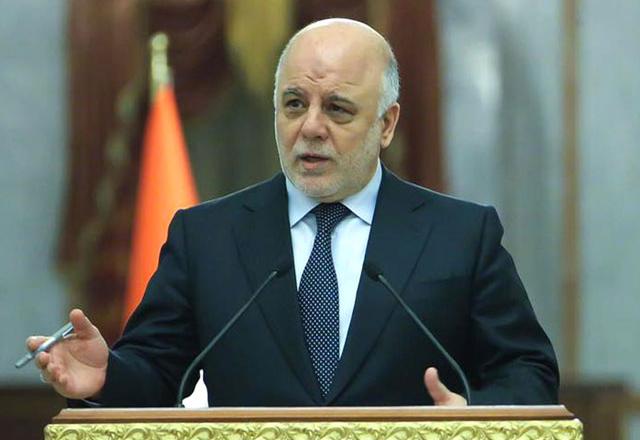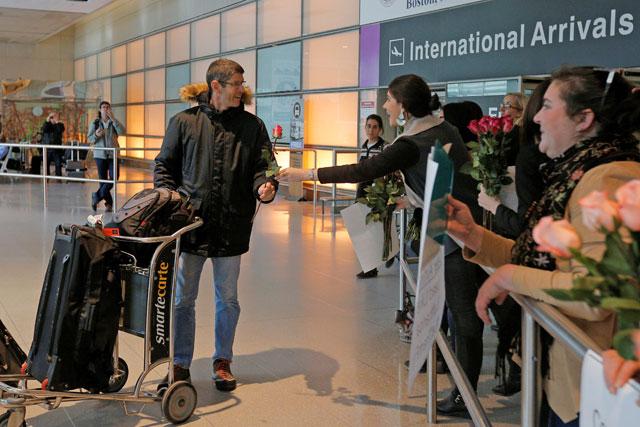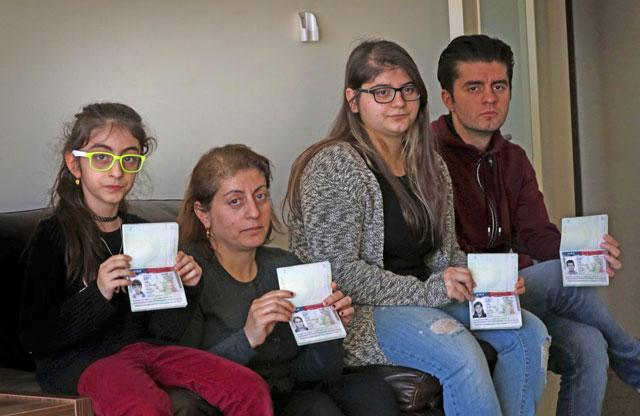You are here
Iraq PM says US ban punishes those ‘fighting terrorism’
By AFP - Jan 31,2017 - Last updated at Jan 31,2017

A handout photo released by the Iraqi prime minister’s press office on Tuesday, shows Iraqi Prime Minister Haidar Al Abadi (centre) speaking during an official meeting in the capital Baghdad (AFP photo)
BAGHDAD — Iraq’s Prime Minister Haider Al Abadi said on Tuesday that President Donald Trump’s decision to ban Iraqis from travelling to the United States punishes those who are “fighting terrorism”.
Trump signed an executive order barring citizens of Iraq and six other Muslim-majority countries from entering the US for at least 90 days, a move he billed as an effort to make America safe from “radical Islamic terrorists”.
The travel restrictions, which come on the heels of repeated assertions by Trump that the US should have stolen Iraq’s oil before leaving in 2011, risk alienating the citizens and government of a country fighting against militants the president has cast as a major threat to America.
“You come to the victim to hold him accountable, to the people who are sacrificing, who are fighting terrorism, to punish them,” Abadi said, in his first reaction to the ban.
“We do not now want to do anything now... but we are studying all our choices.”
The Iraqi foreign ministry has already called on Washington to review the travel restrictions, which it said were the “wrong decision”.
And parliament voted to back reciprocal measures against the US if Washington does not change course — a move that does not implement restrictions but which does reflect the widespread displeasure with Trump’s ban.
The dispute over the travel ban comes amid a massive Iraqi operation to retake the city of Mosul from the Daesh group — a battle for which a US-led coalition is providing air support and other assistance.
Even if Iraq did implement travel restrictions on Americans, it does not seem likely that they would be applied to coalition forces.
But US Senators John McCain and Lindsay Graham said the ban could impact military cooperation and security in other ways.
Lives upended
“This executive order bans Iraqi pilots from coming to military bases in Arizona,” where they have received training, they said in a joint statement that drew condemnation from Trump.
“Ultimately, we fear this executive order will become a self-inflicted wound in the fight against terrorism,” they said.
The travel restrictions have upended the lives of Iraqis who were planning to move to the US — some of whom have waited for years to obtain visas.
Fuad Sharif and his wife quit their jobs, sold their belongings and left for the US with their three children, but were prevented from boarding their flight in Cairo despite having valid visas.
Now they are back in Iraq, staying at his brother-in-law’s empty home and living off savings, Sharif said.
“I am relying on the money I have to live... now I am without work and my wife is without work and the children are without schools,” he said.
The measures do not only affect those seeking to move to the US — they also bar people from visiting.
Vian Dakhil, An Iraqi lawmaker who has campaigned prominently for fellow Yazidi women enslaved by the Daesh terror group, said the restrictions may prevent her from travelling to the US to accept the Lantos Human Rights Prize next week.
The Lantos Foundation said Dakhil’s situation highlights the flaws in Trump’s decision.
It “is a startling example of how the executive order signed by President Trump is having unintended consequences and ensnaring not only those who have no links to terrorism but also those who have risked their lives to fight terrorism in cooperation with the United States”, the foundation said.
Related Articles
BEIRUT/DAMASCUS/WASHINGTON — Citizens of seven mainly Muslim countries who were banned from the United States by President Donald Trump can
WASHINGTON — US President Donald Trump on Monday signed a revised ban on travellers from six Muslim-majority nations, scaling back the order
BAGHDAD — Iraqi lawmakers voted Monday to call on the government to enact a reciprocal travel ban on Americans if Washington does not withdr


















